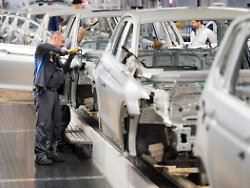Wednesday June 16, 2021
Economy is taking a hit
Global delivery bottlenecks are holding back growth
German industry is dependent on global supply chains. The automotive industry in particular is currently struggling with an acute shortage of chips, but there are also raw material shortages in other sectors. The Ifo Institute is therefore correcting its economic forecast for 2021 slightly downwards.
According to the economic forecast of the Ifo Institute, the global supply bottlenecks will slow down the economic recovery in Germany after the corona pandemic. The Munich economists expect growth of 3.3 percent for this year, as the institute announced. That would be 0.4 percentage points less than expected in March. According to the economic researcher Timo Wollmershäuser, the bottlenecks in the delivery of preliminary products have a dampening effect in the short term. On the other hand, things could go up much more strongly in the coming year than originally thought. For 2022, the Ifo Institute increased its growth forecast by 1.1 points to 4.3 percent.
Notwithstanding this, the scientists assume that the corona crisis will result in losses of 382 billion euros in the German economy from 2020 to 2022. The basis is the assumption that without the crisis the economy could have grown by an annual average of 1.2 percent. In 2020, gross domestic product, adjusted for price, shrank by almost five percent. Wollmershäuser and his colleagues assume that the situation on the labor market will also ease increasingly. At the end of May, an estimated 2.3 million people were still on short-time work. For the coming year, the economists expect only 100,000 short-time workers, just as few as before the beginning of the crisis. Unemployment could therefore fall from 2.7 million at the end of 2020 to 2.4 million in the coming year.
But citizens and companies have to be prepared for a noticeable rise in prices compared to the previous year. For this year, the Ifo Institute expects an inflation rate of 2.6 percent, mainly due to higher energy prices and the renewed increase in VAT. Wollmershäuser also predicts a foreign trade boom – with exports growing by 10.4 percent this year. Accordingly, imports could even increase by 11.4 percent, which would also reduce the German current account surplus, which is often criticized abroad.
.
